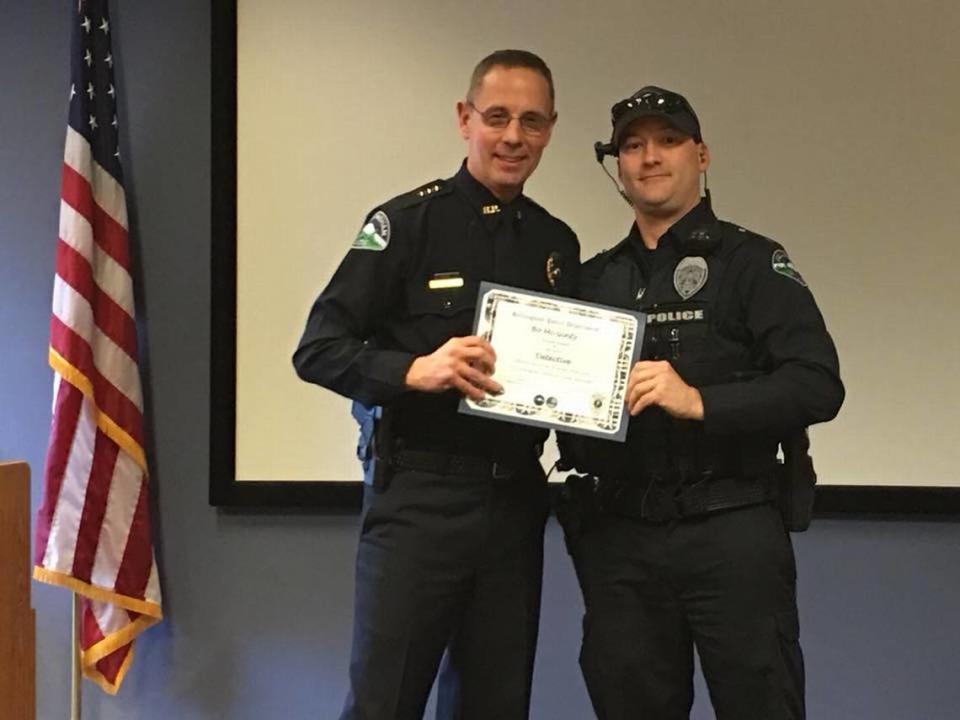Bellingham police detective allegedly misused public funds, investigation determines
The lead Bellingham Police Department detective who was investigating three school administrators for their alleged failure to report a student’s sexual assaults has been placed on a dishonest officers list for allegedly misappropriating and misusing public funds.
An internal affairs administrative investigation by the Bellingham Police Department concluded that Detective Adam (Bo) S. McGinty, with the special victims unit “demonstrated dishonesty” by using another detective’s name to obtain additional dry cleaning services.
The administrative investigation ultimately determined that McGinty allegedly violated state theft laws, “that he misappropriated or misused public funds and that he engaged in conduct that was criminal, dishonest or disgraceful,” according to a Friday afternoon letter from the Whatcom County Prosecuting Attorney’s Office sent out to Whatcom County attorneys and obtained by The Bellingham Herald.
The July 21 letter sent from the prosecutor’s office is a notification that McGinty has been placed on the “Brady” list.
The “Brady” list, maintained by the prosecutor’s office, is a list of law enforcement officers whose credibility has been called into question. The officers on the list have most commonly been found to have been dishonest, lied while in an official capacity, or have been accused or found guilty of past misconduct.
Prosecutors are legally required to turn the list over to defense attorneys if an officer on the “Brady” list is involved or worked on a case. This information can then be used to impeach the officer as a witness if they are called to testify in court.

The Whatcom County prosecutor’s office determined that if a reasonable person, like a judge or juror, heard certain information related to McGinty, they could conclude that McGinty “demonstrated dishonesty by violating Bellingham Police standards of conduct that include theft of services by aid of deception,” the impeachment disclosure letter states.
Under Bellingham Police Department’s collective bargaining agreement with unionized employees, each law enforcement officer is allotted dry cleaning costs equivalent to the cost of cleaning one uniform per week.
Accounting noticed that two detectives were using dry cleaning services far greater than the allotted amount.
Bellingham police administration contacted McGinty and another detective for using excessive amounts of dry cleaning, according to the letter.
“The other detective expressed surprise saying that he hadn’t used dry cleaning in three years. Detective McGinty told the administration that the other detective had nothing to do with these issues,” the letter states.
“It was determined that Detective McGinty had used another detective’s name to obtain additional dry cleaning services.”
The length of time the alleged conduct occurred or the monetary amount McGinty is accused of misappropriating was not included in the letter and not immediately available.
The findings from the internal affairs investigation determined McGinty violated three standards of conduct governing Bellingham Police Department employees, according to the letter. However, the policy that contains the three standards of conduct McGinty is accused of violating is not one of the publicly available, listed policies for the police department on the city of Bellingham’s website.
The Herald has reached out to Bellingham police for more information regarding which policies McGinty is determined to have violated, the amount of funds he’s accused of misappropriating, the length of time the alleged conduct occurred, and whether any discipline has been recommended for or issued to McGinty.
Investigation background
Bellingham Police started its internal affairs investigation into McGinty on May 18. He was placed on paid administrative leave three weeks later, on June 7, and removed from the investigation into the three school administrators, according to prior reporting in The Herald.
McGinty, who was previously Bellingham Public Schools’ district resource officer, spent more than a year working on the investigation into the administrators. The three administrators have since been criminally cited for failing to report a high school student’s sexual assaults. Their jury trial is scheduled to begin in late August, The Herald previously reported.
In addition to the internal administrative investigation, McGinty is also the subject of a criminal investigation into his actions that is being conducted by the Mount Vernon Police Department.
The Herald has reached out to Mount Vernon police for an update on the criminal investigation.
The Skagit County Prosecuting Attorney’s Office had not received any reports from Mount Vernon police regarding McGinty as of 2:30 p.m. Friday, according to Skagit County chief criminal deputy Rosemary Kaholokula.
The Skagit prosecutor’s office will determine whether any charges will be filed against McGinty and if so, will handle the case against him. The Whatcom County prosecutor’s office sent the case to Skagit due to conflicts of interest and to promote the appearance of fairness, Whatcom County Prosecuting Attorney Eric Richey said.
“It’s disappointing and unfortunate,” Richey said when reached by The Herald Friday afternoon. “It’s disappointing to see these things happen with law enforcement officers.”
Richey declined to comment on whether the determinations made in the internal affairs investigation into McGinty, or the fact that he is the subject of a criminal investigation, will impede the prosecution’s ability to present its case at trial or resolve the three criminal cases against the school district administrators.


